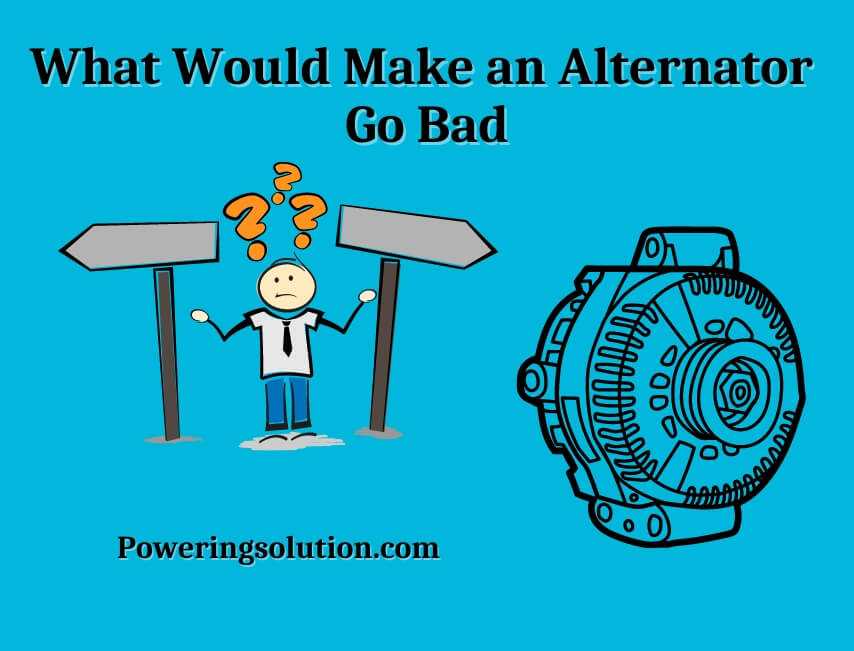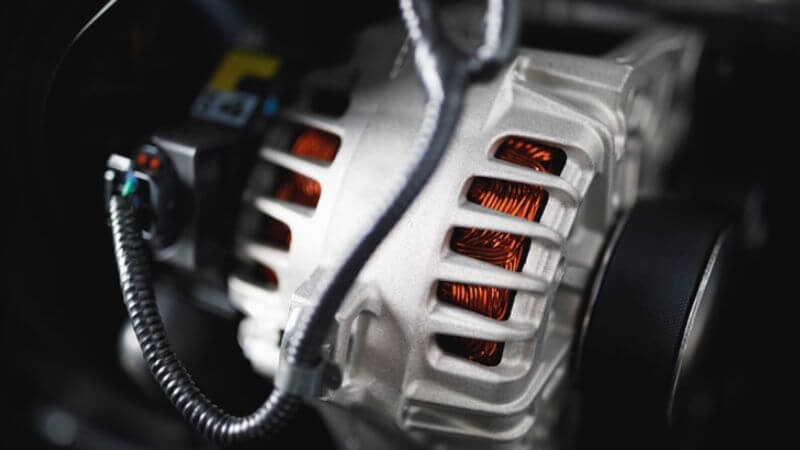If your car has an alternator, it is important to know what can make it go bad. The most common cause of alternator failure is a belt that has broken or become worn. If the alternator belt breaks, the engine will not be able to turn the alternator pulley, and the battery will not charge.

Alternator belts should be checked periodically for wear and replaced as needed. Another common cause of alternator failure is a problem with the brushes or bearings. The brushes are what conduct electricity to the rotor, and the bearings support the spinning of the rotor.
If either of these parts fails, the alternator will not work properly.
If your car has been having trouble starting, it may be time to replace the alternator. Alternators can go bad for a number of reasons, but the most common is simply wear and tear. Over time, the bearings in an alternator can break down, causing it to spin less efficiently.
This will eventually lead to the alternator not being able to charge the battery properly, and your car will have trouble starting.
There are other reasons that an alternator can go bad as well. If your car’s engine is overworked, it can cause the alternator to fail.
Additionally, if there is a problem with the electrical system in your car, it can also cause problems with the alternator. If you suspect that your alternator might be going bad, it’s important to take your car to a mechanic right away so they can diagnose the problem and make any necessary repairs.
How Long Does an Alternator Last?
An alternator is a vital component in your car’s electrical system, converting the mechanical energy from the engine into electricity to power the vehicle’s lights, accessories, and other electronic components. So how long does an alternator last?
On average, an alternator can last anywhere from 4 to 10 years, depending on a number of factors.
The most important factor is typically the quality of the alternator itself—higher-quality alternators will often last longer than lower-quality ones. Other important factors include how often you drive (frequent driving shortens alternator lifespan), how hard you drive (heavy loads shorten lifespan), and whether or not you maintain your car regularly (regular maintenance lengthens lifespan).
If you think your alternator might be going bad, it’s important to get it checked out as soon as possible—a failing alternator can cause all sorts of problems, including stalling and battery drain.
If you’re in need of an Alternator Replacement, our team at Meineke Car Care Center can help. We’ll test your Alternator and replace it if necessary—all at a great price.
What Happens When an Alternator Goes Out While Driving?
If your alternator goes out while you’re driving, don’t panic. Pull over to the side of the road and turn on your hazard lights. Then call a tow truck or Roadside Assistance to come and help you.
If you have a spare alternator or battery, you may be able to replace it yourself, but it’s always best to call a professional for assistance.
Can an Alternator Go Bad from Sitting?
Yes, an alternator can go bad from sitting. If the alternator is not properly maintained, it can develop problems that will prevent it from working correctly. Alternators are designed to convert the engine’s mechanical energy into electrical energy, and if they are not working properly, the engine will not run smoothly.
When an alternator goes bad, it will usually cause the engine to misfire or stall.
How Often Do Alternators Go Bad?
How often do alternators go bad? This is a difficult question to answer because it can vary so much from one car to the next. In general, however, most alternators will last for about 50,000 miles before they need to be replaced.
Of course, this number can be affected by a number of factors, including how often you drive your car and how well you maintain it. If you take good care of your car and don’t drive it too hard, you may be able to get more miles out of your alternator than the average driver.
What Causes a New Alternator to Go Bad?
A new alternator can go bad for a number of reasons. The most common cause is a failure in the bearings. This can be caused by a manufacturing defect, improper installation, or simply wear and tear.
Other causes include electrical problems, such as a short circuit, or a problem with the regulator. Finally, a new alternator can also fail due to physical damage, such as being hit by a rock or debris on the road.
About Bad Alternator
A bad alternator can cause a number of problems with your car, from dimming lights to a dead battery. But how can you tell if it’s the alternator or the battery that’s causing these issues? Here’s a look at the symptoms of each so you can diagnose the problem and get your car back on the road.
Bad Alternator Symptoms:
If your alternator is going bad, you’ll likely see one or more of these symptoms:
Dimming Headlights
As your alternator starts to fail, it won’t be able to provide enough power to keep your headlights bright.
This is often one of the first signs that something is wrong.
Dead Battery
A failing alternator can’t charge the battery, so eventually, it will run out of power and die. If this happens, you may notice that your car has trouble starting or that the accessories (like the radio) don’t work when the engine is off.
Engine Stalls
If your alternator isn’t providing enough power, your engine may stall while you’re driving. This can be dangerous, so it’s important to get it checked out as soon as possible.
Can You Jumpstart a Car With a Bad Alternator?
If your car has a bad alternator, you may be able to jumpstart it using another vehicle. However, this is not always the case and it is best to consult your owner’s manual or a mechanic before attempting this. If you do decide to jumpstart your car with a bad alternator, be sure to disconnect the negative cable from the battery before attaching it to the other vehicle.
A low car battery can affect the heater in a few ways. First, if the battery is not providing enough power to the engine, then the engine will not be able to run at its full potential. See here for details.
Repeated Alternator Failure
If your alternator fails once, it’s a pain. If it fails twice, you might be wondering if there’s something wrong with your car. Alternator failure is actually pretty common, and it usually happens because the alternator is overworked.
The alternator is responsible for charging the battery and powering the electrical system while the engine is running. If something goes wrong with either of these things, the alternator has to work harder to compensate. This extra strain can eventually lead to alternator failure.
There are a few things that can cause an alternator to fail repeatedly. One possibility is that there’s a problem with the electrical system that’s causing the alternator to work harder than normal. Another possibility is that the alternator itself is faulty and needs to be replaced.
If you’re having problems with repeated alternator failure, take your car to a mechanic and have them check out the electrical system.

What Can Cause an Alternator to Fail?
If your car’s alternator fails, it can cause a number of problems. The most common problem is that the battery will drain, which can lead to the car stalling or not starting at all. Alternators can also fail due to a faulty voltage regulator, bad bearings, or a broken drive belt.
If you suspect that your alternator is failing, take it to a mechanic for diagnosis and repair.
What Kills an Alternator?
An alternator is a device that generates electricity by converting mechanical energy into electrical energy. It is usually powered by a belt connected to the engine’s crankshaft. The alternator charges the battery and powers the electrical system when the engine is running.
The main cause of alternator failure is overheating. The alternator produces heat as it converts mechanical energy into electrical energy. If it gets too hot, it will shut down to prevent damage.
Overheating can be caused by a number of things, including:
- A defective cooling fan;
- A problem with the drive belt;
- A buildup of dust or debris in the engine compartment;
- A failed bearing in the alternator itself.
Alternator failure can also be caused by a sudden loss of power, such as when the engine stalls or there is an interruption in the electrical supply. This can damage the internal components of the alternator and cause it to fail.
Do Alternators Fail Suddenly?
No, alternators do not fail suddenly. If an alternator begins to fail, it will first show signs of weakening performance. For example, the car’s headlights may dim when the engine is idling, or the battery may die sooner than expected.
Once an alternator starts to fail completely, it will cause the engine to stall.
What are Common Alternator Problems?
One of the most common problems with alternators is that the bearings can go bad, causing the alternator to make a grinding noise. If you hear this noise, it’s important to have your alternator checked out as soon as possible. Other common problems include a failing voltage regulator or rectifier.
These components are responsible for converting the alternating current from the stator into a direct current that can be used by your vehicle’s electrical system. When they fail, they can cause all sorts of electrical problems. Another problem that can occur is a buildup of carbon on the commutator.
This can happen if the engine is run too lean, meaning there’s not enough fuel in the mixture. The carbon will eventually build up to the point where it prevents electricity from flowing properly through the alternator, causing it to malfunction. If you’re having trouble with your alternator, it’s best to take it to a qualified mechanic for diagnosis and repair.
Trying to fix it yourself could result in further damage and potentially put you in danger if you don’t know what you’re doing.
In a Nutshell
If your car isn’t starting, it could be a sign that your alternator is going bad. The alternator is responsible for powering the electrical system in your car, and if it’s not working properly, the battery will eventually drain. There are a few other signs that your alternator might be going bad, including dimming headlights, flickering dashboard lights, and strange noises coming from the engine.
If you notice any of these symptoms, take your car to a mechanic to have it checked out.
